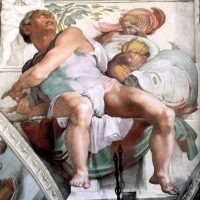March 12: The Book of Jonah / El Libro de Jonás
-
 Many among our Jewish ancestors were deeply frustrated at Israel’s hardness of heart. Why did they, God’s own people, with such a rich heritage, refuse to reform their ways and respond to God with faith and justice, with prayer and hope?
Many among our Jewish ancestors were deeply frustrated at Israel’s hardness of heart. Why did they, God’s own people, with such a rich heritage, refuse to reform their ways and respond to God with faith and justice, with prayer and hope?The author of the Book of Jonah was among the many who experienced this frustration. Yet, he reveals a sense of the unsuspected “breaking through of grace” by God which allows us to know that there’s always hope! As long as life lasts, we must never lose hope in others or indeed in ourselves. Things can always improve, in the local or national scene, and even in world affairs, like the present tensions in war-torn places, the hardships which the poor experience daily, and even the political challenges our own country is facing today. Surely, by the grace of God, conversions and transformations can take place.
The Book of Jonah is only four chapters long. Carve out some time before the week is over to re-visit it or visit it for the first time. Notice how marvelous it is that the once-pagan city of Nineveh could come to believe in God, proclaim a fast, and pray for forgiveness in order to become a model of goodness for all the rest of us! Hope can certainly come in surprising ways!
***
Convertirse es posible para todos, incluso para los paganos; incluso para los que son notorios por su crueldad, como el pueblo que esclavizó a los judíos. Cuando el autor del Libro de Jonás dijo esto a los judíos, fue para ellos un mensaje sorprendente. “Convertirse”… para los judíos, bien; pero ¿para los paganos, los no creyentes?
Jesús parece que les da la vuelta a las cosas: Los paganos se vuelven a Dios, pero ustedes, pueblo de Dios, no. ¿No somos nosotros quizás demasiado satisfechos y pagados de nosotros mismos, pensando que somos pueblo de Dios, y por lo tanto mejores que los demás, y por eso no necesitamos conversión? Sin embargo, hoy se nos llama a vivir más profundamente el Evangelio, para que sea realmente Buena Noticia para nosotros y para los hermanos y hermanas en derredor nuestro.
